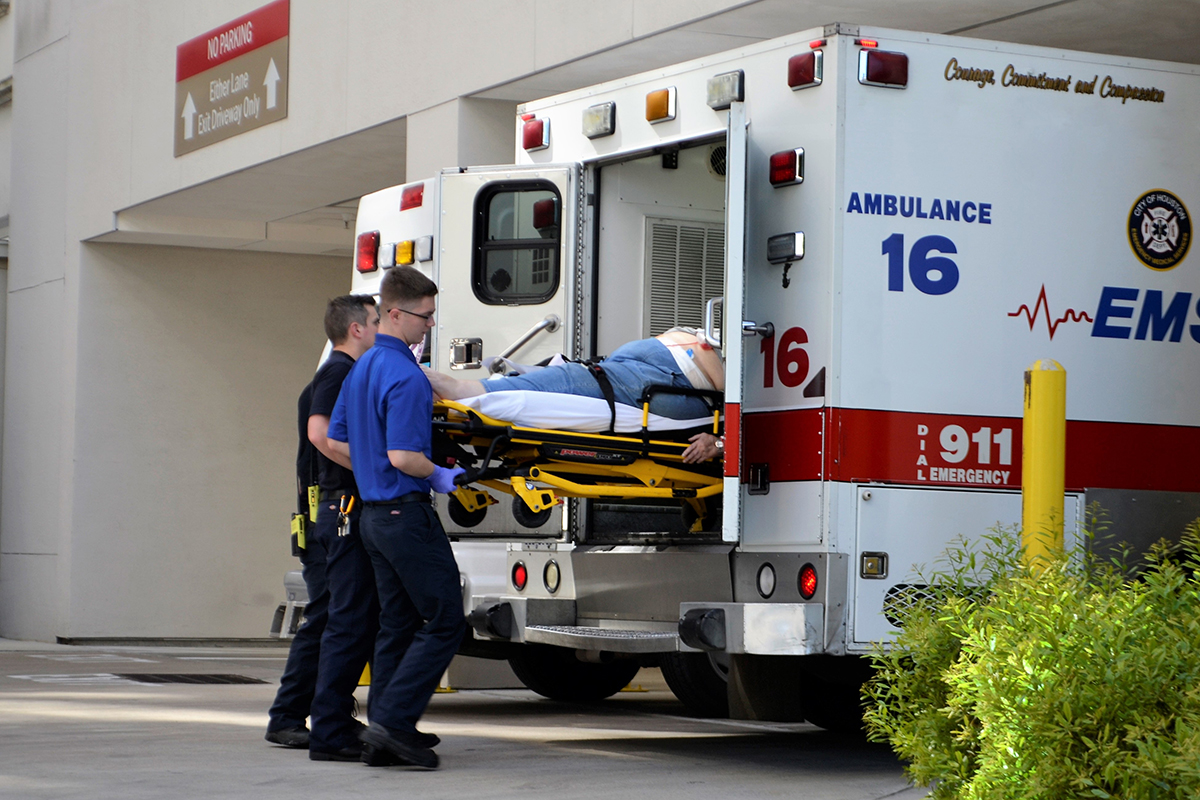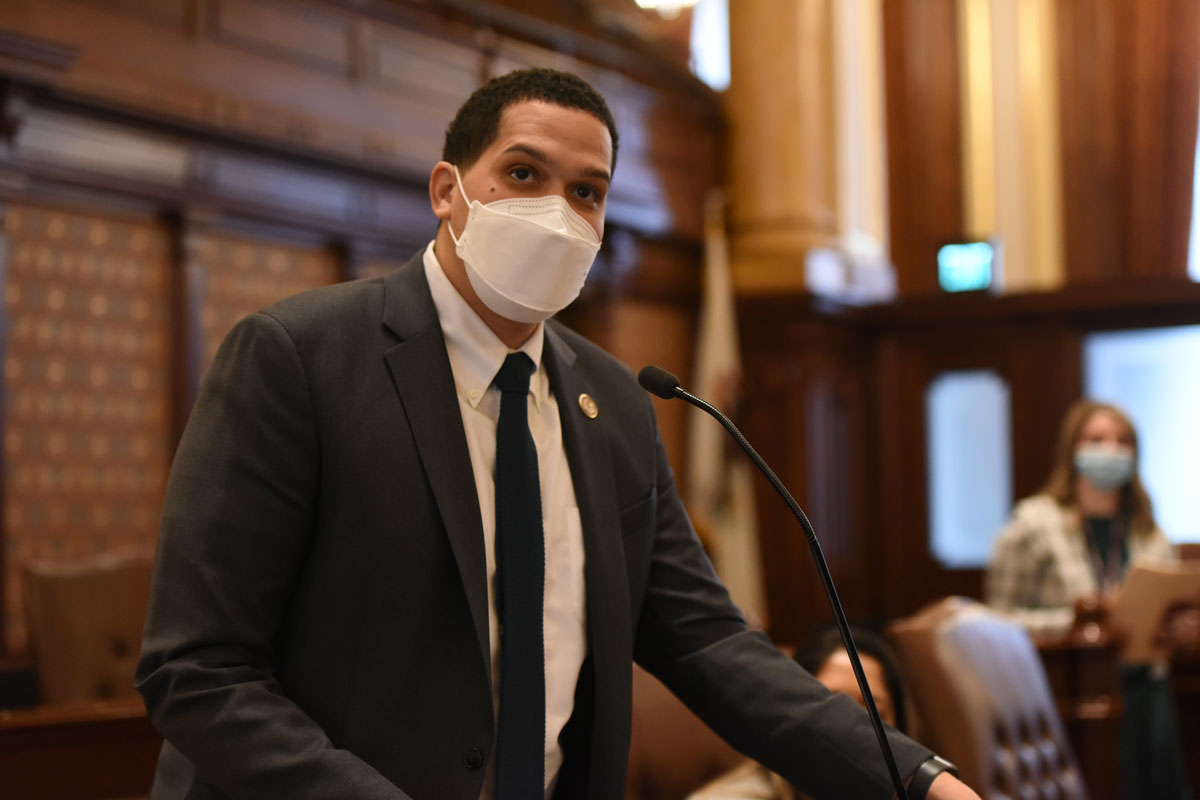- Details
- Category: Senator Robert Peters News
SPRINGFIELD – A measure sponsored by State Senator Robert Peters (D-Chicago) would fix a technical problem that prevents some local school councils of Chicago Public Schools from meeting.
“Local school councils are essentially the only way that local communities have the ability to impact how schools in their area run,” said Peters, who also supports an elected Chicago School Board. “Current law makes it more difficult – and sometimes impossible – for them to do the work they were elected to do when they have too many vacancies at one time.”
Local school councils are able to appoint additional members to fill vacancies. However, when membership falls below seven members as a result of too many vacancies, LSCs are prohibited from meeting. Peters’ measure would allow the councils too meet with only four members present, should the number in office drop too low.
Read more: Peters advocates for local school councils to continue meeting, despite vacancies
- Details
- Category: Senator Robert Peters News

SPRINGFIELD – As part of his continued fight to win and preserve safety and justice, State Senator Robert Peters (D-Chicago) moved a proposal to strengthen alternative mental health and substance abuse crisis responses through the Senate Friday.
“A mental health or substance abuse crisis requires a specific, dedicated response that only trained professionals are adequately equipped provide,” Peters said. “Many police officers lack this training and are forced to respond to situations they’re not prepared to handle, which can often make the situation worse. We need to strengthen alternative response methods so that people who are suffering crises are able to get the right kind of help.”
Senate Bill 347 creates the Alternatives to Crisis Escalation Act, which will increase the availability of underused mental health and substance abuse crisis response services. The measure also aims to spread and expand awareness of alternative responses, as well as ensure their availability to everyone regardless of insurance status.
Read more: Peters backed Alternatives to Crisis Escalation Act passes Senate
- Details
- Category: Senator Robert Peters News
 SPRINGFIELD – A proposal to make Illinois the ninth state to mandate a minimum amount of time for play each day for students is one step closer to becoming law after the Illinois Senate approved it Thursday.
SPRINGFIELD – A proposal to make Illinois the ninth state to mandate a minimum amount of time for play each day for students is one step closer to becoming law after the Illinois Senate approved it Thursday.
“Unstructured play is a critical part of a child’s development,” said State Senator Robert Peters (D-Chicago), the legislation’s sponsor. “I know this from experience, since it played a key role in my upbringing. When you add in the benefit that physical activity provides to growing children, it’s easy to see why guaranteeing time for play is something we need to do.”
Read more: Peters one step closer to guaranteeing playtime for students
- Details
- Category: Senator Robert Peters News
 SPRINGFIELD – A measure sponsored by State Senator Robert Peters (D-Chicago) allowing state’s attorneys to petition for sentence reductions passed the Illinois Senate Wednesday.
SPRINGFIELD – A measure sponsored by State Senator Robert Peters (D-Chicago) allowing state’s attorneys to petition for sentence reductions passed the Illinois Senate Wednesday.
“There are several factors that go in to determining a sentence for a crime, but in time, some or all of those factors could change,” Peters said. “Giving state’s attorneys the ability to ask a court to reduce sentences will ensure that people aren’t locked up for longer than they should be.”
- Details
- Category: Senator Robert Peters News
SPRINGFIELD – State Senator Robert Peters (D-Chicago) is leading an effort to speed up the process when abused and neglected minors are moved between counties during the process of finding a suitable guardian.
“The kids we’re talking about here have already experienced abuse or neglect, or they’re otherwise dependent on the social services our state provides,” Peters said. “They shouldn’t get caught up in the court bureaucracy when they need to move between counties.”
The legislation requires that, when child protection cases are transferred between counties, the clerk of the transferring county must submit all related documentation within 15 days to the receiving county, which must then set a status hearing within 10 days of receipt. Currently, there is no timeframe for the process.
Read more: Peters moves to make sure abused and neglected minors aren’t caught in the court system
- Details
- Category: Senator Robert Peters News

SPRINGFIELD – Using a law he previously sponsored as a foundation, State Senator Robert Peters (D-Chicago) is looking to expand civics education for re-entering citizens to the Illinois Department of Juvenile Justice.
“Many of the kids set to be released from IDJJ custody are doing so at a time in their lives when they’ll be legally recognized as adults for the first time, and a lot of new rights and privileges become available to them,” Peters said. “A person doesn’t lose access to those rights just because they were locked up, so it’s important to ensure that everyone knows what their rights are, how they can work to protect them, and the ways in which they can exercise them if they choose to do so.”
Senate Bill 2116 is an expansion of the Re-Entering Civics Education Act, a measure Peters sponsored that became law in 2019. The act required the Department of Corrections to provide civics education containing information around voting rights, government institutions, and simulations of the electoral and voting process to anyone who was scheduled to be released from custody within the next 12 months. The newest proposal expands this requirement to the Department of Juvenile Justice as well.
Read more: Peters plan extends civics education to youth in IDJJ facilities
- Details
- Category: Senator Robert Peters News
 SPRINGFIELD – The Illinois Senate approved a proposal sponsored by State Senator Robert Peters (D-Chicago) that looks to preserve the integrity of restorative justice practices, which are sometimes used in place of traditional court proceedings.
SPRINGFIELD – The Illinois Senate approved a proposal sponsored by State Senator Robert Peters (D-Chicago) that looks to preserve the integrity of restorative justice practices, which are sometimes used in place of traditional court proceedings.
“We rely on restorative justice as an alternative method of addressing crime, but in order to be effective, those practicing it need to be sure it’s a safe space,” Peters said. “If someone is afraid that something they say might come back to be used against them, they’re far less likely to take full advantage of the benefits that a restorative justice practice has to offer.”
Peters’ legislation would prevent anything said or done during, in preparation for, or as a follow-up to a restorative justice practice from being used against someone in court, unless the protection is waved. The fact that a practice happened or is planned would be similarly privileged. A restorative justice practice is a measure to prevent trauma and repair harm by bringing adverse parties and community stakeholders together. They are becoming more common in schools, communities, and even courts.
“In order to win real safety and justice in our communities, we need to find effective alternatives to policing,” Peters said. “Restorative justice practices fill that role, so we need to work to preserve them.”
Senate Bill 64’s next stop is the House of Representatives.
- Details
- Category: Senator Robert Peters News
 SPRINGFIELD – In an effort to combat a decades-long decrease in time set aside for physical activity in school, State Senator Robert Peters (D-Chicago) is sponsoring a measure to require schools to provide students with daily time for play.
SPRINGFIELD – In an effort to combat a decades-long decrease in time set aside for physical activity in school, State Senator Robert Peters (D-Chicago) is sponsoring a measure to require schools to provide students with daily time for play.
“Children have a right to play, period,” Peters said. “Physical activity is a crucial part of a child’s development, and since children spend most of their time at school, all schools should offer recess.”
More Articles …
Page 17 of 23















 © 2026 Illinois Senate Democratic Caucus
© 2026 Illinois Senate Democratic Caucus